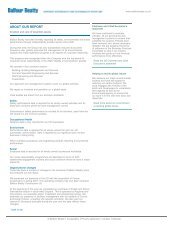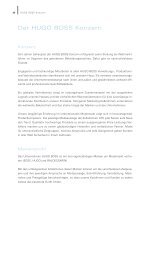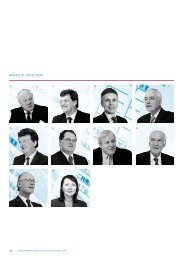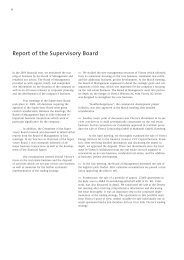E_mg_GB_03_vorne-29_3_04
E_mg_GB_03_vorne-29_3_04
E_mg_GB_03_vorne-29_3_04
Create successful ePaper yourself
Turn your PDF publications into a flip-book with our unique Google optimized e-Paper software.
Milk<br />
Last year, over 160 million cows worldwide produced roughly 500 million tonnes of milk.<br />
The milk produced by buffalo, goats, sheep, mares and camels brought this total to approximately<br />
600 million tonnes. GEA is a major player in the market for milking technology, with<br />
a share of roughly 30 percent. Its subsidiary WestfaliaSurge is a leading manufacturer of<br />
milking equipment, milk-cooling equipment and dairy supplies, i.e. facilities for equipment<br />
cleaning, animal hygiene, spare parts, accessories as well as services and advice on milk<br />
production.<br />
Milk production is on the increase: it is forecast to be 615 million tonnes in 2005. The volume<br />
of milk processing – to make yogurts, drinks and desserts, for example – is also growing.<br />
Every year approximately P1.6 billion is invested in milk-processing equipment, of which GEA<br />
holds a market share of approximately 12 percent.<br />
The engineers at WestfaliaSurge know that a one-size-fits-all approach to milking is not<br />
sufficient. Due to their peculiar characteristics, for example, cows, goats, mares and buffalo<br />
need to be treated differently to camels. The order to supply milking equipment for the<br />
world’s first dairy farm for camels, being built in Dubai in the Persian Gulf, was therefore a<br />
pioneering venture for the experts at WestfaliaSurge. Camels’ milk tastes almost the same<br />
as cows’ milk but, because it contains less than two percent fat, is much easier to digest<br />
and is practically already homogenized. In addition, camels’ milk contains five times as<br />
much vitamin C as cows’ milk. Camels’ milk is also said to have highly beneficial properties<br />
for allergies, diabetes and neurodermatitis.<br />
Although many consumers might find the idea of cows riding a carousel a bit unusual, it is<br />
now part of everyday life for many farmers. AUTOROTOR is the name of WestfaliaSurge’s<br />
milking carousel, which can be used to milk up to 100 cows at the same time. China provided<br />
the GEA subsidiary with two of the largest orders in its history and the entire milking<br />
technology industry: for approximately P4 million it supplied 15 milking carousels, each<br />
capable of milking 48 cows, and 50 milk-cooling tanks to the Chinese province of Fujin.<br />
63 milking carousels are being supplied to Inner Mongolia as part of an order worth<br />
P4.5 million. The customer for both orders is Changfu, one of China’s largest dairies. The<br />
first 30 carousels are due to be delivered to Inner Mongolia by February 20<strong>04</strong>, and the<br />
rest will follow in the summer. The order comprises 61 milking carousels that can each<br />
milk 24 cows at the same time and two systems capable of milking 48 cows each. China’s<br />
dairy market is growing at the rate of 30 percent per year.<br />
GEA subsidiary Tuchenhagen Dairy Systems won a major contract from the milk-processing<br />
industry. The company is building four new milk-processing production lines in Leppersdorf,<br />
eastern Germany. The customer for the order is Sachsenmilch AG. The contract comprises<br />
all engineering, assembly and commissioning services for the production lines. The first<br />
production line is scheduled to come on stream in April 20<strong>04</strong>, and three further lines are<br />
due to be added in August.<br />
33









